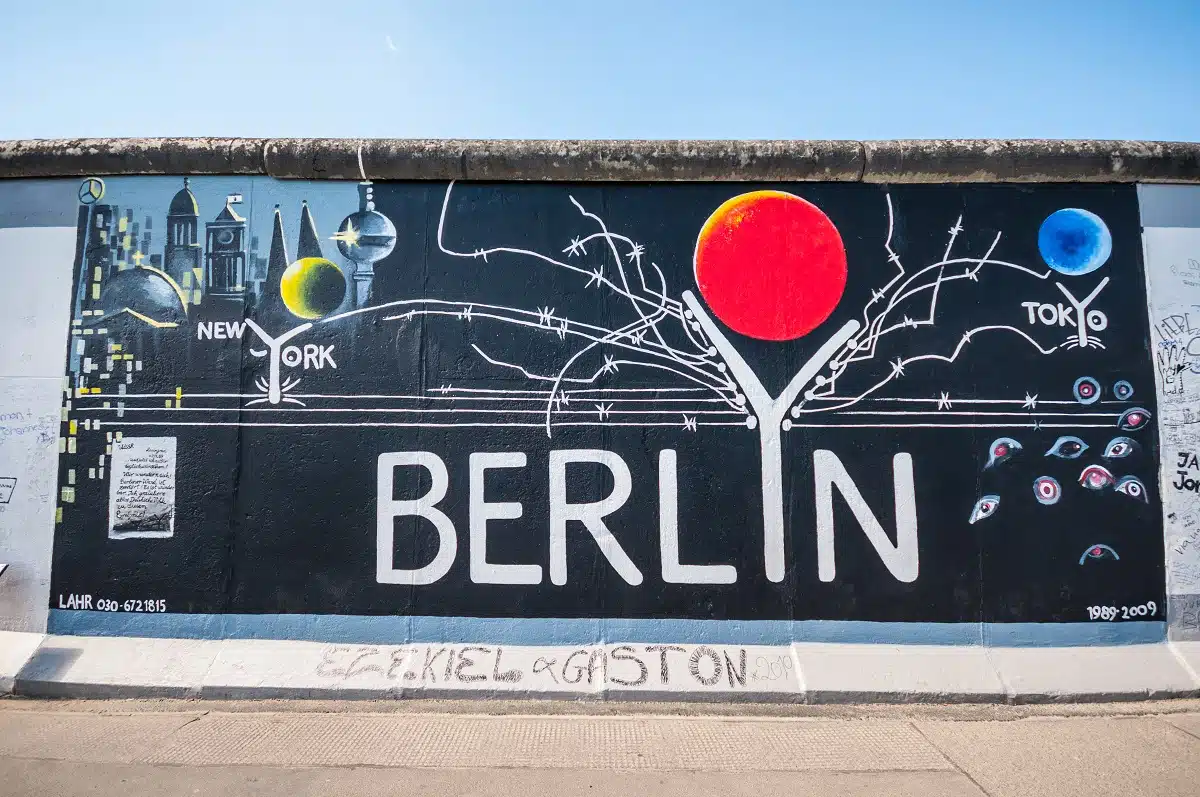Berlin, a city steeped in history and rebirth, is a vibrant canvas of artistic expression. From the graffiti-laden remnants of the Berlin Wall to contemporary galleries and street art, Berlin’s art scene is as diverse as its history. This guide delves into the heart of Berlin’s art world, exploring various facets of its rich artistic culture. Whether you’re an art aficionado or a curious traveler, Berlin’s dynamic art scene has something to captivate everyone.
1. East Side Gallery
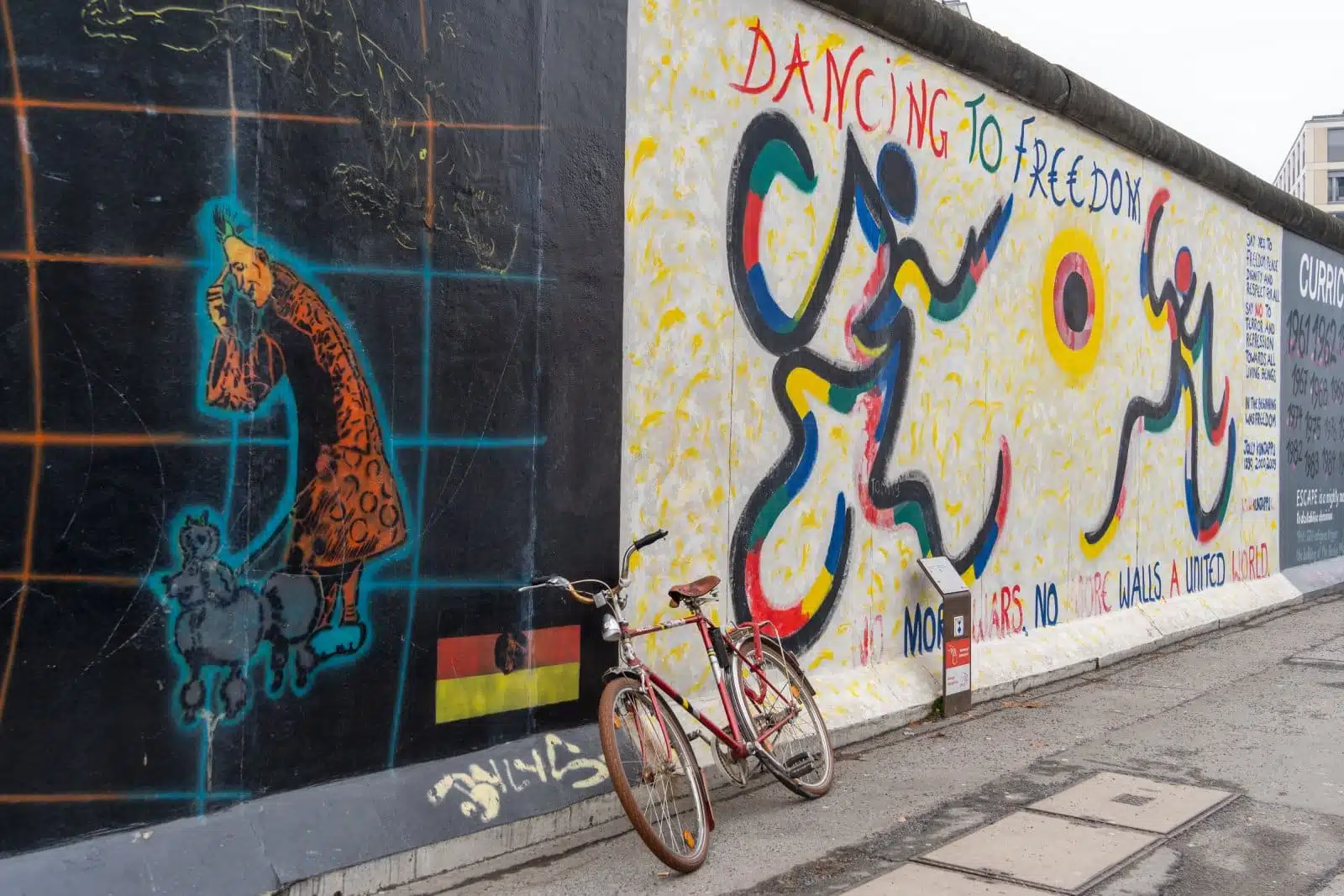
Image Credit: Shutterstock / Hazel Plater
The East Side Gallery is a monumental reminder of Berlin’s turbulent history and transformation into a canvas of artistic expression. This long stretch of the Berlin Wall, now an open-air gallery, features over 100 murals painted by artists from around the world. Each piece tells a unique story, reflecting themes of freedom, peace, and political commentary. The gallery includes iconic works like Dmitri Vrubel’s “Fraternal Kiss” and Birgit Kinder’s “Test the Rest.” Walking along this historic monument, you’re not just witnessing art; you’re walking through a piece of history that continues to resonate with people globally. It’s a place where the past and present merge, offering a profound experience that goes beyond conventional art viewing.
Insider’s Tip
Visit early in the morning or during weekdays to avoid crowds and get unobstructed views of the artwork.
When To Travel
Spring or early fall for pleasant weather and fewer tourists.
How To Get There
Take the S-Bahn to Warschauer Straße station, a short walk to the gallery.
2. Urban Nation
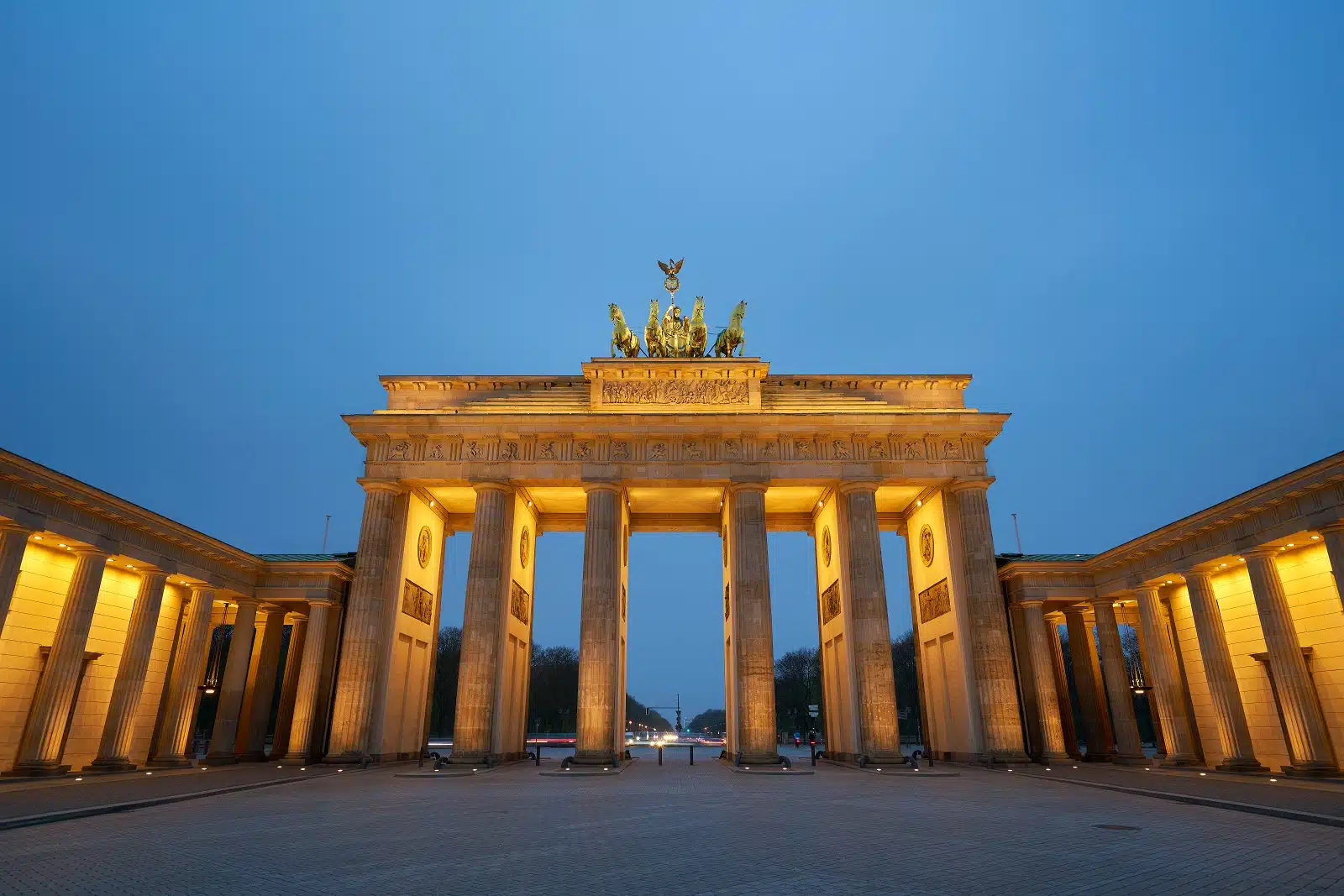
Image Credit: Shutterstock / LuisPinaPhotography
Urban Nation in Berlin’s Schöneberg district is a groundbreaking museum that brings street art’s raw energy and creativity indoors. It’s a space where the rebellious spirit of graffiti and street art is celebrated and preserved. The museum’s ever-changing facade showcases the dynamic nature of street art. Inside, you’ll find works from renowned street artists like Shepard Fairey and Banksy alongside emerging talents. The museum also plays a crucial role in community engagement, hosting workshops, lectures, and live performances, making it a hub for contemporary urban art culture.
Insider’s Tip
Check out the museum’s workshops and events for a deeper insight into the street art scene.
When To Travel
Year-round, as the museum offers indoor exhibitions.
How To Get There
Take the U-Bahn to Bülowstraße station, just a few steps from the museum.
3. Hamburger Bahnhof
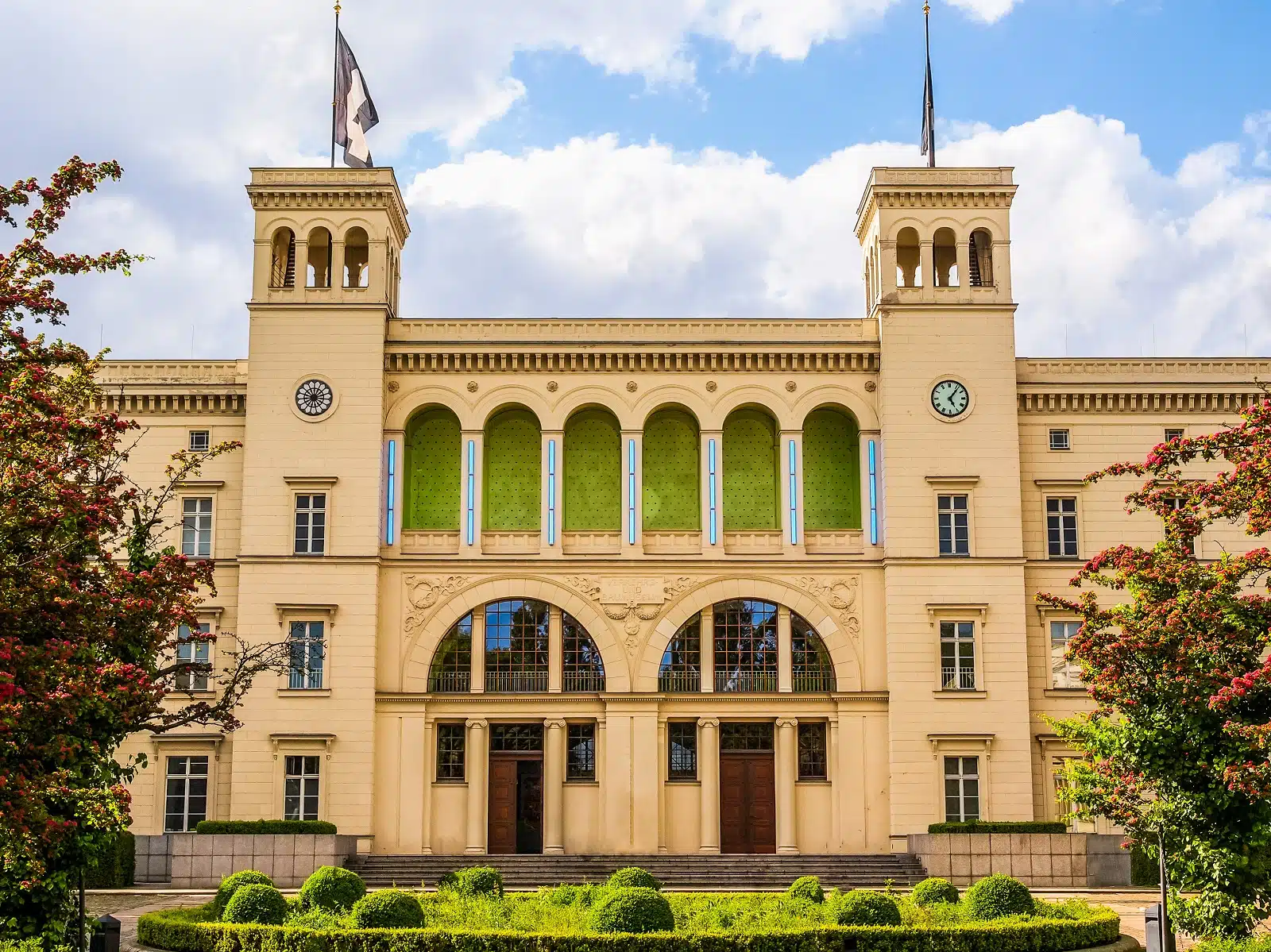
Image Credit: Shutterstock / Claudio Divizia
Hamburger Bahnhof, a former railway station turned contemporary art museum, is a marvel in its architecture and extensive art collection. The museum is part of Berlin’s National Gallery. It hosts a wide range of modern and contemporary art pieces, including works from the likes of Andy Warhol, Anselm Kiefer, and Joseph Beuys. The juxtaposition of historical architecture with contemporary art creates a unique atmosphere that enhances the viewing experience. The museum’s vast, open spaces are perfectly suited to large-scale installations and experimental art forms, making it a must-visit for anyone interested in the evolution of contemporary art.
Insider’s Tip
Don’t miss the permanent exhibition of the Friedrich Christian Flick Collection.
When To Travel
Visit year-round; winter is quieter.
How To Get There
Take the S-Bahn to Hauptbahnhof, and it’s a short walk from there.
4. Künstlerhaus Bethanien
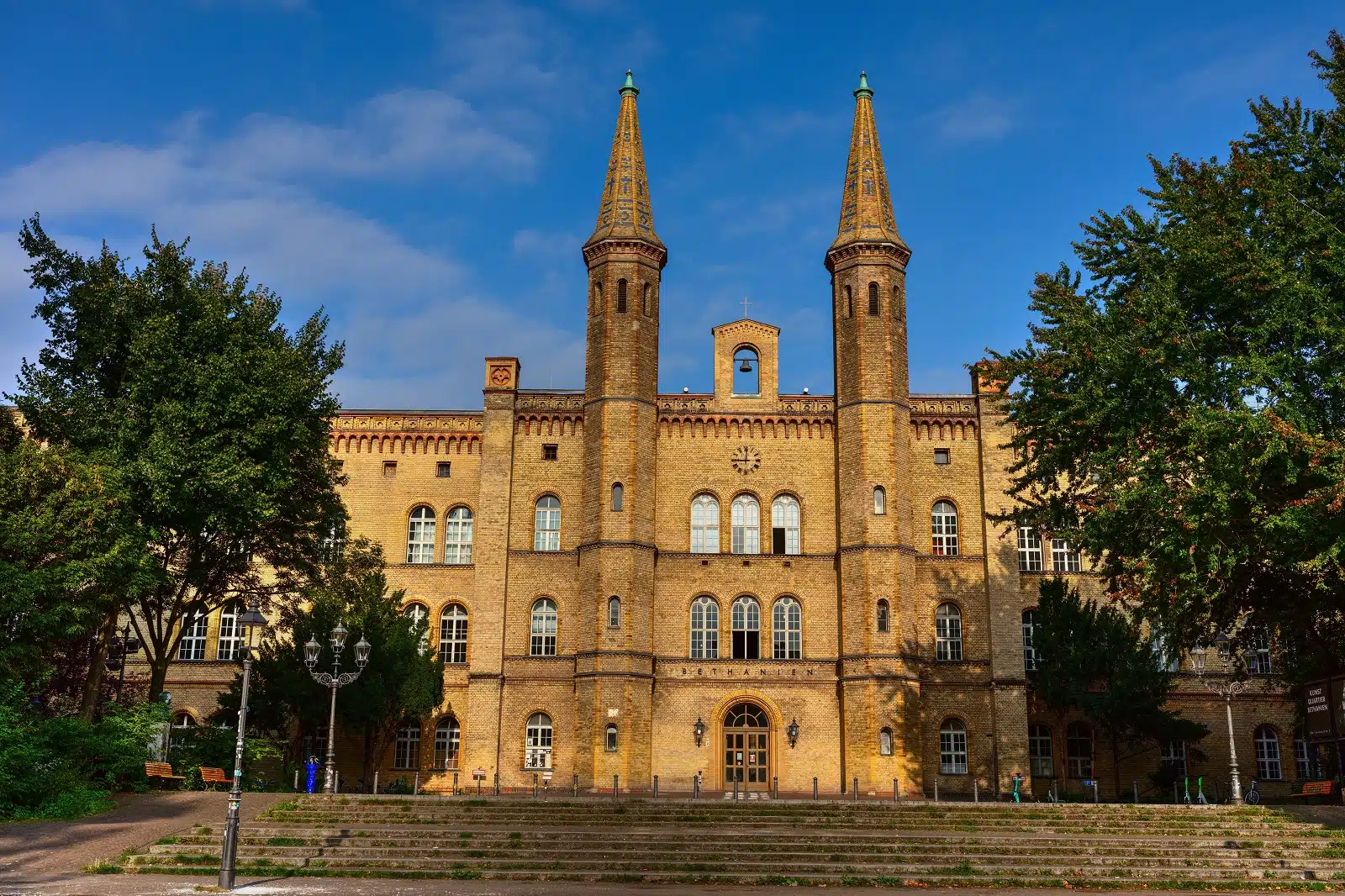
Image Credit: Shutterstock / Yevgen Belich
Künstlerhaus Bethanien, located in Kreuzberg’s heart, is an art center and a creative incubator. This former hospital now serves as a studio space for artists from around the world, fostering a vibrant international artistic community. The center is known for its artist-in-residence program, which allows visitors to engage with artists and their work in a very intimate setting. The exhibitions here are often cutting-edge, featuring a wide range of media and styles. It’s a place to witness the creative process firsthand and see how international influences and local culture intertwine.
Insider’s Tip
Attend one of the open studio days to meet the artists and see their work in progress.
When To Travel
Year-round, with various events and exhibitions happening throughout the year.
How To Get There
Take the U-Bahn to Kottbusser Tor or the bus to Adalbertstraße/Oranienstraße.
5. Berlinische Galerie

Image Credit: Shutterstock / BERK OZDEMIR
The Berlinische Galerie, situated in a former glass warehouse in Kreuzberg, is dedicated to modern art, photography, and architecture, focusing on works created in Berlin. The museum’s collection spans from 1870 to the present, offering a comprehensive overview of the city’s artistic evolution. Here, you can explore a variety of art forms, including Expressionism, the Dada movement, and the New Objectivity. The gallery also features contemporary art exhibitions, showcasing the work of living artists who contribute to Berlin’s vibrant art scene. The Berlinische Galerie is not just a museum; it’s a narrative of Berlin’s artistic journey, reflecting the city’s tumultuous history and its impact on creativity and expression.
Insider’s Tip
Look out for temporary exhibitions, which often feature cutting-edge contemporary artists.
When To Travel
Visit year-round; weekdays are less crowded.
How To Get There
Take the U-Bahn to Moritzplatz or the bus to Jüdisches Museum.
6. Street Art Tours

Image Credit: Shutterstock / gary718
Berlin’s street art is a visual chronicle of its cultural and political landscape. Joining a guided street art tour is one of the best ways to delve into this aspect of the city’s identity. These tours take you beyond the typical tourist spots to hidden corners where the walls speak. You’ll see works ranging from large-scale murals to subtle stencils, each with its own story. Guides, often local artists themselves, provide insights into the meanings and the artists behind these creations, offering a deeper understanding of Berlin’s street art culture.
Insider’s Tip
Choose a tour led by a local artist for authentic insights into the street art community.
When To Travel
Spring to fall for comfortable walking weather.
How To Get There
Tours typically start from central locations easily accessible by public transport.
7. Kunst-Werke Institute for Contemporary Art

Image Credit: Shutterstock / Mo Photography Berlin
Kunst-Werke, or KW Institute for Contemporary Art, is a cornerstone of Berlin’s contemporary art scene. Located in a former margarine factory in Mitte, KW is known for its experimental and innovative exhibitions. It’s a place where contemporary art in all its forms – visual arts, performance, music, and more – finds a platform. The institute is also known for organizing the Berlin Biennale, one of the world’s most significant contemporary art events. Visiting KW is not just about viewing art; it’s about experiencing the pulse of contemporary creativity.
Insider’s Tip
Visit the courtyard café for a relaxing break amidst art.
When To Travel
Year-round, with each season offering different exhibitions.
How To Get There
Take the U-Bahn to Weinmeisterstraße or Rosenthaler Platz.
8. Sammlung Boros

Image Credit: Shutterstock / 360b
Sammlung Boros Collection is a private collection of contemporary art housed in a converted World War II bunker. This unusual setting creates a striking contrast with the modern artworks displayed within. The collection includes works by international artists and is known for its bold and challenging pieces. Visiting the Boros Collection is an experience that goes beyond traditional art viewing, offering a unique blend of history, architecture, and contemporary art.
Insider’s Tip
Book a guided tour in advance, as visits are only possible with prior arrangements and they fill up quickly.
When To Travel
Year-round, but booking well in advance is essential regardless of the season.
How To Get There
Take the S-Bahn or U-Bahn to Friedrichstraße station, followed by a short walk.
9. Martin-Gropius-Bau
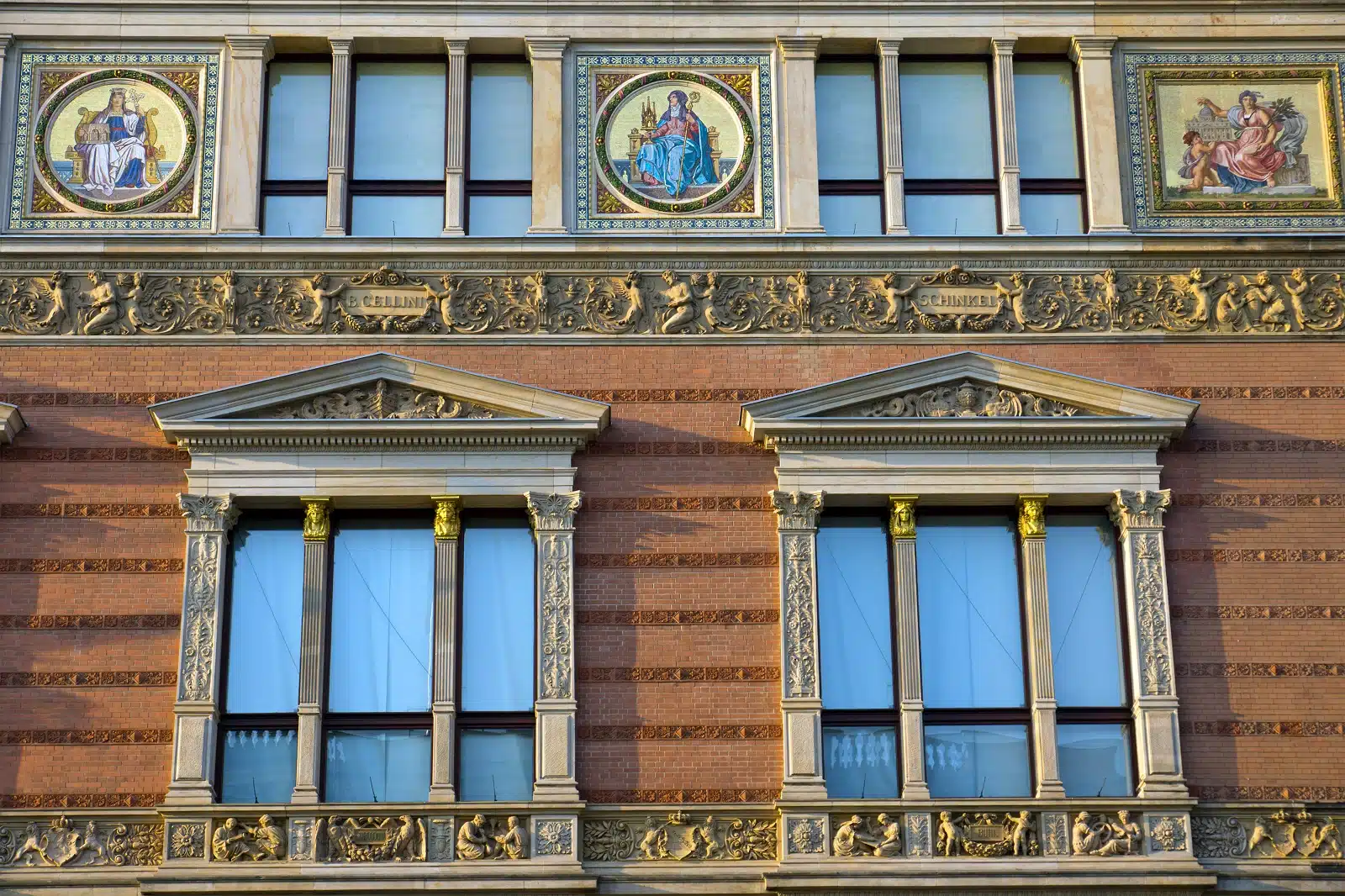
Image Credit: Shutterstock / elxeneize
Martin-Gropius-Bau is one of Berlin’s most celebrated exhibition spaces, known for its diverse and high-caliber exhibitions. The building itself, with its impressive Renaissance architecture, is a work of art. Inside, you’ll find various exhibitions, from contemporary art and photography to historical and archaeological shows. The space is known for hosting large-scale international exhibitions, making it a key player in Berlin’s cultural scene.
Insider’s Tip
Check their schedule for international art and cultural history exhibitions, which are often unique to this venue.
When To Travel
Visit year-round; each season offers different exhibitions.
How To Get There
Take the U-Bahn to Potsdamer Platz or the S-Bahn to Anhalter Bahnhof.
10. Bode Museum
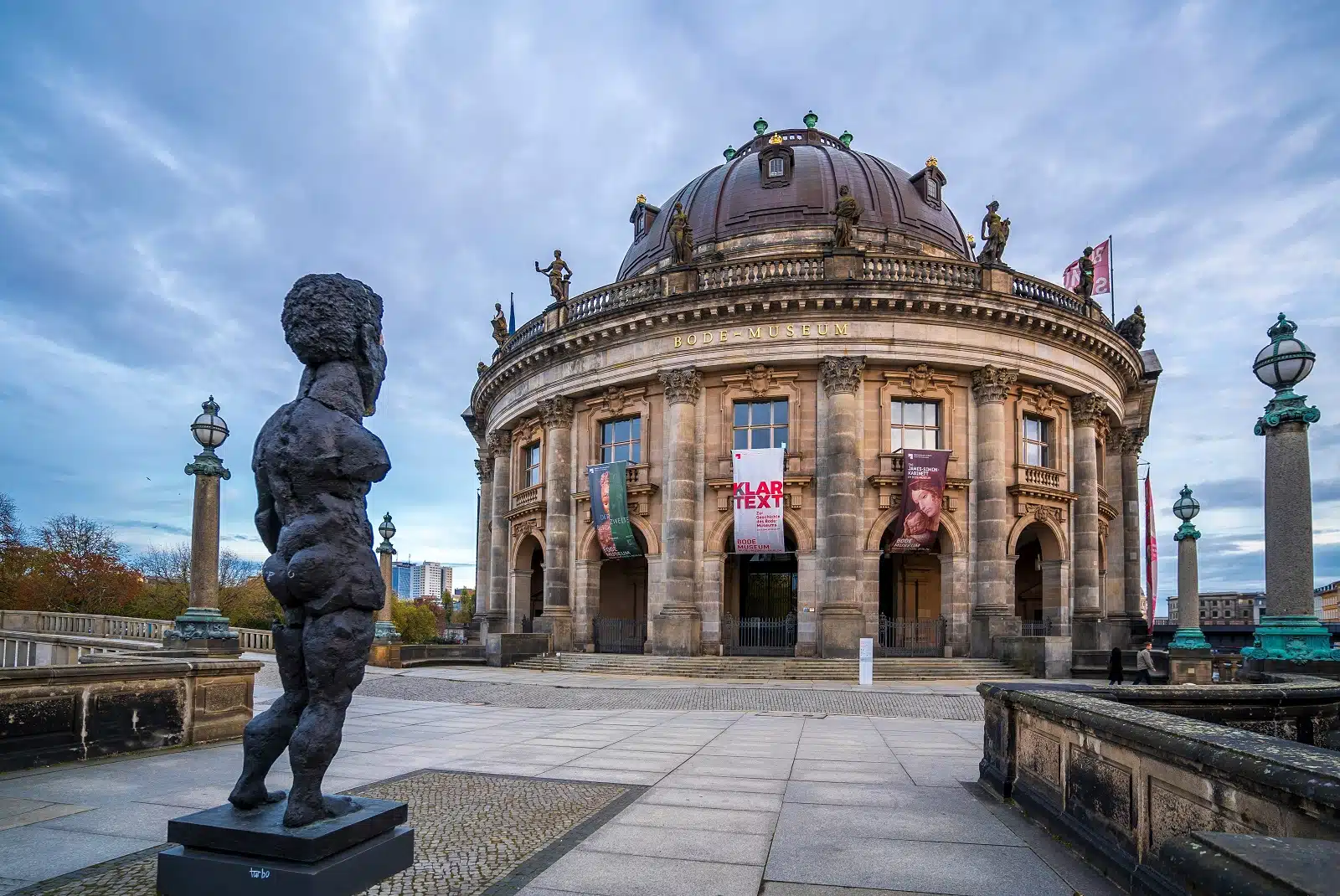
Image Credit: Shutterstock / Nejdet Duzen
Located on the northern tip of Museum Island, the Bode Museum is an architectural beauty that houses diverse sculptures, Byzantine art, and a numismatic (coin) collection. The museum’s layout is designed to allow a seamless journey through different art periods and styles, making it an educational and visual experience. The Bode Museum provides a unique perspective on the development of European art. It is particularly renowned for its collection of sculptures from the Middle Ages to the late 18th century. The museum’s serene atmosphere and the beauty of the artworks make it a haven for art lovers.
Insider’s Tip
Don’t miss the Sculpture Collection, which spans from the early Middle Ages to the late 18th century.
When To Travel
Year-round, though winter is less crowded.
How To Get There
Take the U-Bahn or S-Bahn to Friedrichstraße station, then walk or take a tram.
11. C/O Berlin
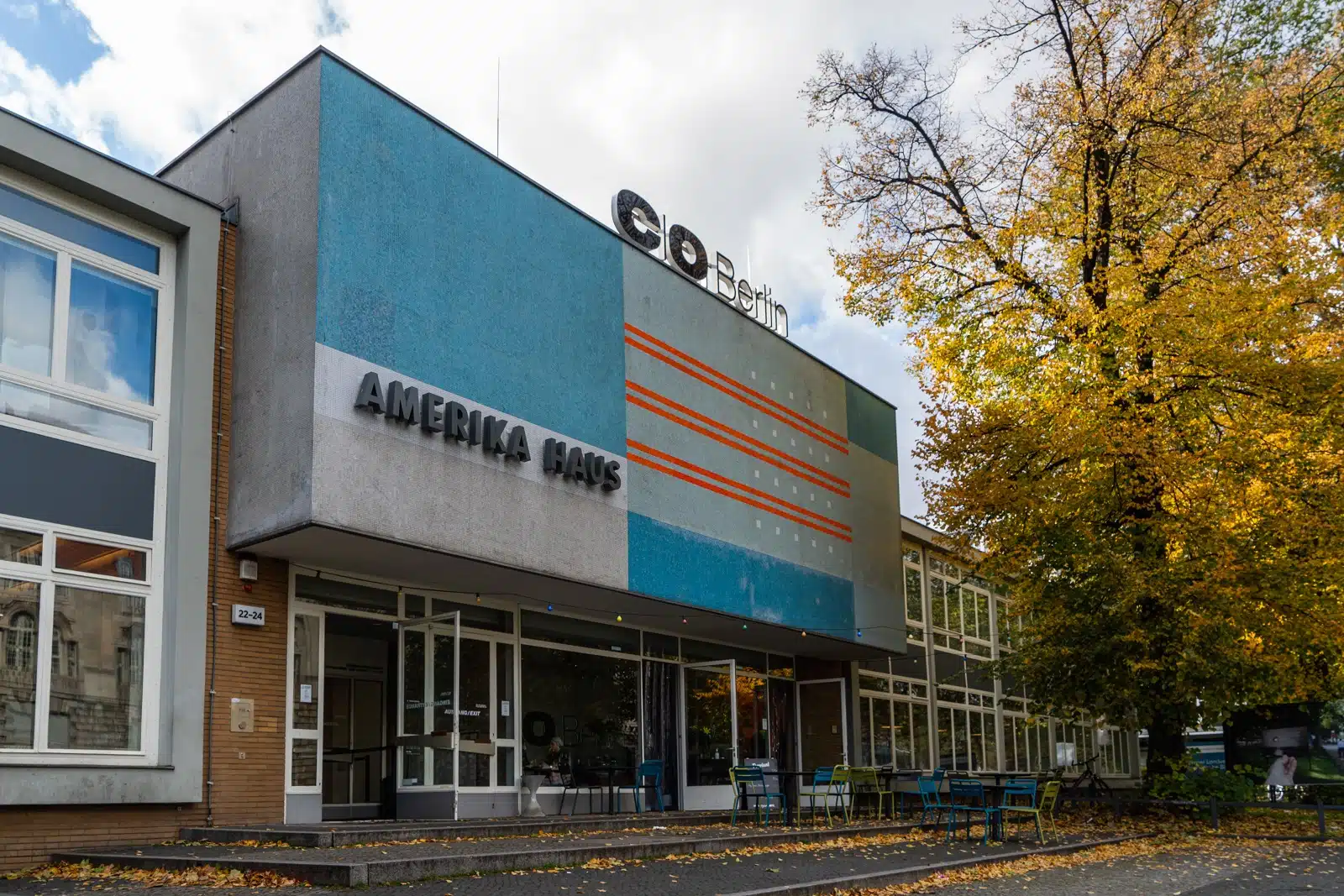
Image Credit: Shutterstock / Mo Photography Berlin
C/O Berlin is a celebrated venue for photography and visual media. Located in the historic Amerika Haus, C/O Berlin showcases the work of renowned photographers and emerging talents alike. The exhibitions are thoughtfully curated, often focusing on narrative-driven photography that tells compelling stories. This venue is not just about displaying photographs; it’s about exploring the power of visual storytelling. The center also hosts a variety of educational programs, workshops, and artist talks, making it a hub for photography enthusiasts.
Insider’s Tip
Attend one of their evening lectures or workshops to understand contemporary photography.
When To Travel
Year-round, with new exhibitions regularly.
How To Get There
Take the S-Bahn to Zoologischer Garten or the U-Bahn to Wittenbergplatz.
12. Street Art Murals
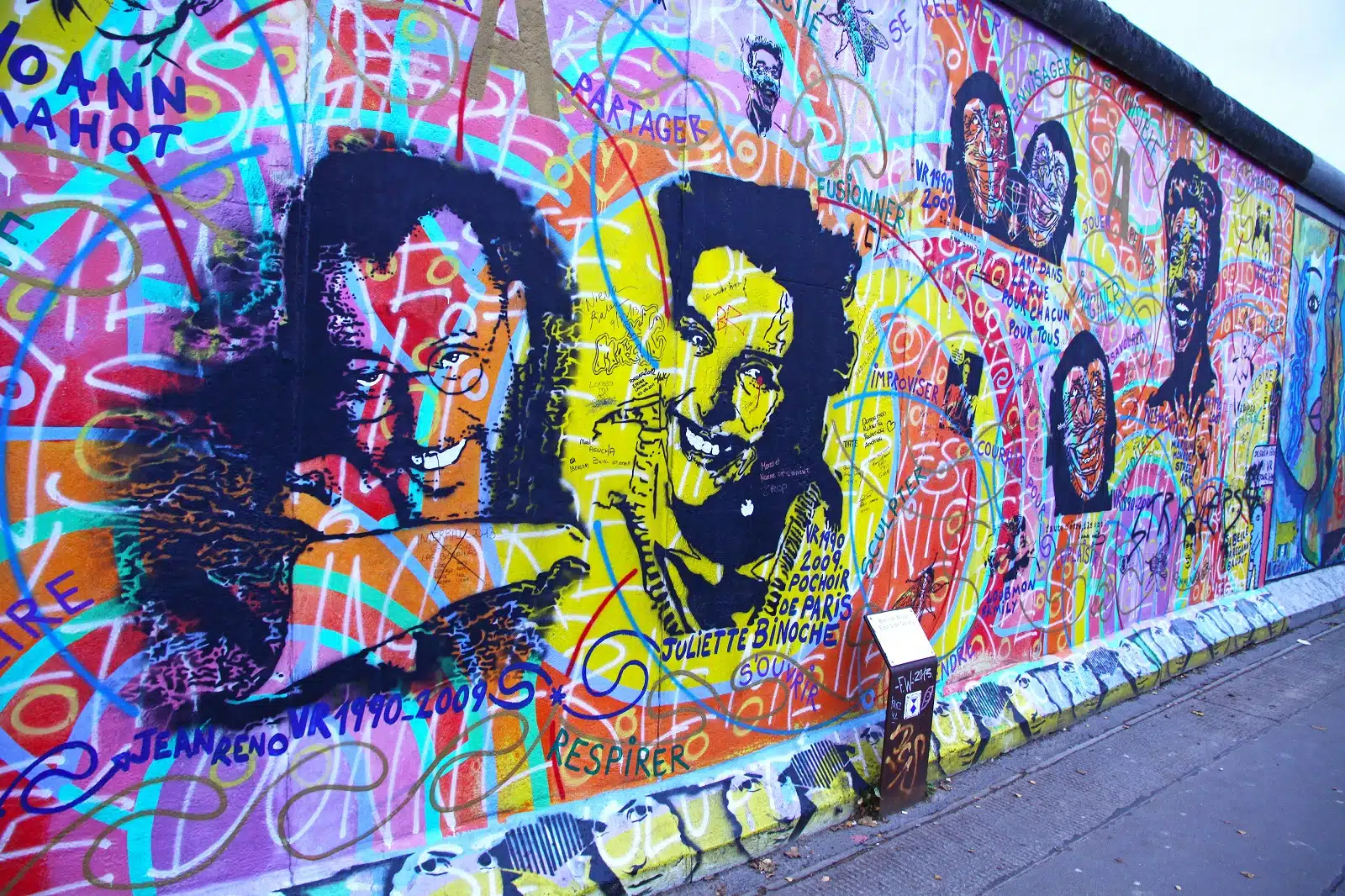
Image Credit: Shutterstock / katatonia82
Berlin’s street art scene is one of the most vibrant in the world, turning the city into a vast open-air gallery. The murals in Berlin are not just decorative; they often carry strong political and social messages. Districts like Kreuzberg, Friedrichshain, and Mitte are adorned with works by both local and international artists. These large-scale murals offer insight into Berlin’s culture. They highlight the city’s spirit of freedom and creativity. Exploring these artworks is a journey through the contemporary soul of Berlin.
Insider’s Tip
Seek out the mural “Astronaut/Cosmonaut” by Victor Ash in Kreuzberg, one of Berlin’s iconic street art pieces.
When To Travel
Spring to early fall for pleasant walking weather.
How To Get There
Each mural is in a different location, but many are accessible via the U-Bahn or by walking.
The Bottom Line
In Berlin, art isn’t confined to galleries and museums; it’s a living part of the city’s fabric, visible on its streets and vibrant cultural spaces. As you explore Berlin’s art scene, you’ll find that it mirrors the city’s diverse, dynamic, and sometimes turbulent history. Each piece, whether it’s a mural on a remnant of the Berlin Wall or a contemporary installation in a gallery, tells a story worth discovering. So, immerse yourself in this artistic metropolis, and let Berlin’s creative energy inspire you.
More From The Green Voyage
Top 10 Trending Travel Destinations 2024
6 Essential Banking Apps for International Travel – Managing Your Finances on the Go Traveling With Kids – 10
Tips to Create Memorable Family Holidays
The post Berlin’s Top 12 Galleries and Street Art – Exploring the City’s Dynamic Art Landscape 2024 first appeared on The Green Voyage.
Featured Image Credit: Shutterstock / Jule_Berlin .
Tips for Trip Success
Book Your Flight
Find an inexpensive flight by using Kayak, a favorite of ours because it regularly returns less expensive flight options from a variety of airlines.
Book Your Hotel or Special Accommodation
We are big fans of Booking.com. We like their review system and photos. If we want to see more reviews and additional booking options, we go to Expedia.
You Need Travel Insurance!
Good travel insurance means having total peace of mind. Travel insurance protects you when your medical insurance often will not and better than what you get from your credit card. It will provide comprehensive coverage should you need medical treatment or return to the United States, compensation for trip interruption, baggage loss, and other situations.Find the Perfect Insurance Plan for Your Trip
